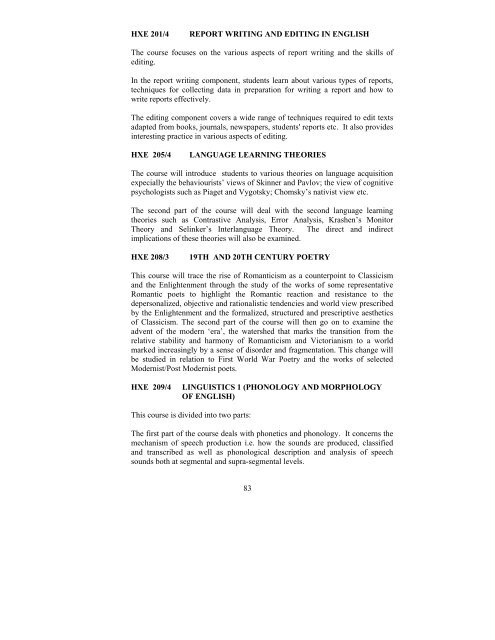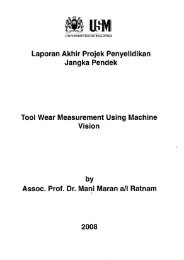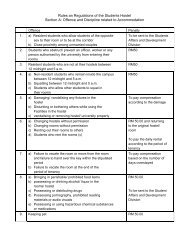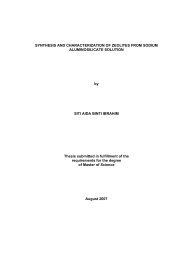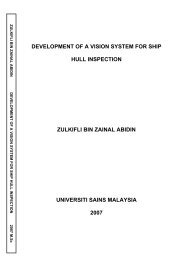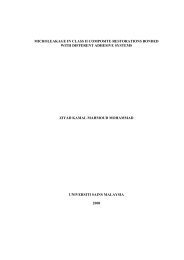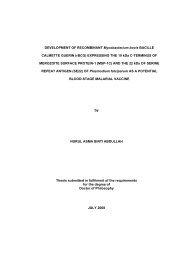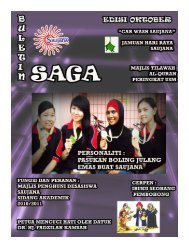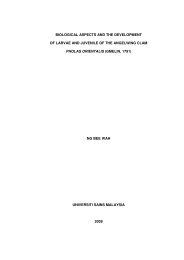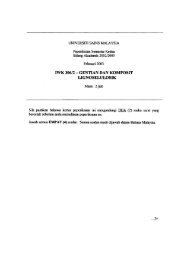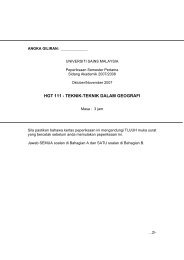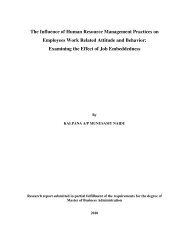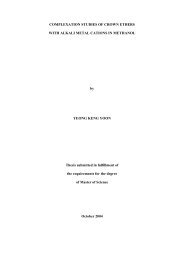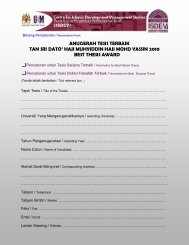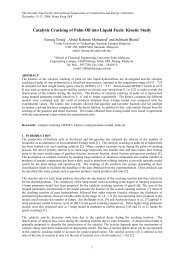IC/Passport Number - School of Humanities, USM
IC/Passport Number - School of Humanities, USM
IC/Passport Number - School of Humanities, USM
Create successful ePaper yourself
Turn your PDF publications into a flip-book with our unique Google optimized e-Paper software.
HXE 201/4<br />
REPORT WRITING AND EDITING IN ENGLISH<br />
The course focuses on the various aspects <strong>of</strong> report writing and the skills <strong>of</strong><br />
editing.<br />
In the report writing component, students learn about various types <strong>of</strong> reports,<br />
techniques for collecting data in preparation for writing a report and how to<br />
write reports effectively.<br />
The editing component covers a wide range <strong>of</strong> techniques required to edit texts<br />
adapted from books, journals, newspapers, students' reports etc. It also provides<br />
interesting practice in various aspects <strong>of</strong> editing.<br />
HXE 205/4<br />
LANGUAGE LEARNING THEORIES<br />
The course will introduce students to various theories on language acquisition<br />
expecially the behaviourists’ views <strong>of</strong> Skinner and Pavlov; the view <strong>of</strong> cognitive<br />
psychologists such as Piaget and Vygotsky; Chomsky’s nativist view etc.<br />
The second part <strong>of</strong> the course will deal with the second language learning<br />
theories such as Contrastive Analysis, Error Analysis, Krashen’s Monitor<br />
Theory and Selinker’s Interlanguage Theory. The direct and indirect<br />
implications <strong>of</strong> these theories will also be examined.<br />
HXE 208/3<br />
19TH AND 20TH CENTURY POETRY<br />
This course will trace the rise <strong>of</strong> Romanticism as a counterpoint to Classicism<br />
and the Enlightenment through the study <strong>of</strong> the works <strong>of</strong> some representative<br />
Romantic poets to highlight the Romantic reaction and resistance to the<br />
depersonalized, objective and rationalistic tendencies and world view prescribed<br />
by the Enlightenment and the formalized, structured and prescriptive aesthetics<br />
<strong>of</strong> Classicism. The second part <strong>of</strong> the course will then go on to examine the<br />
advent <strong>of</strong> the modern ‘era’, the watershed that marks the transition from the<br />
relative stability and harmony <strong>of</strong> Romanticism and Victorianism to a world<br />
marked increasingly by a sense <strong>of</strong> disorder and fragmentation. This change will<br />
be studied in relation to First World War Poetry and the works <strong>of</strong> selected<br />
Modernist/Post Modernist poets.<br />
HXE 209/4<br />
LINGUIST<strong>IC</strong>S 1 (PHONOLOGY AND MORPHOLOGY<br />
OF ENGLISH)<br />
This course is divided into two parts:<br />
The first part <strong>of</strong> the course deals with phonetics and phonology. It concerns the<br />
mechanism <strong>of</strong> speech production i.e. how the sounds are produced, classified<br />
and transcribed as well as phonological description and analysis <strong>of</strong> speech<br />
sounds both at segmental and supra-segmental levels.<br />
83


